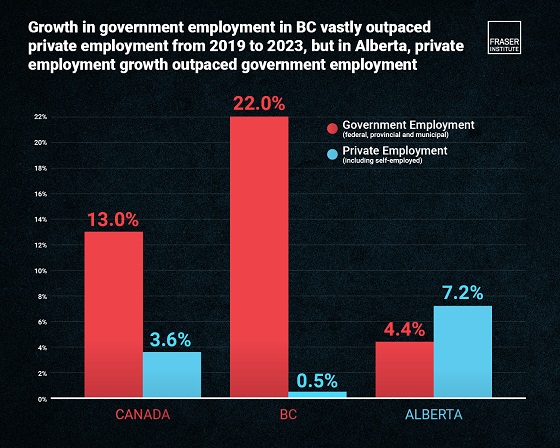Business
Job growth in government exceeded the private sector in 8 out of 10 provinces from 2019-23

From the Fraser Institute
By Ben Eisen and Milagros Palacios
In eight of 10 provinces the rate of government job growth has been higher than the private sector, finds a new study published today by the Fraser Institute, an independent, non-partisan Canadian public policy think-tank.
“Canada’s net job creation in recent years has been disproportionately driven by growth in government employment rather than growth in the private sector, and as of 2019, government employment as a share of total employment in the country is at its highest point since the mid-1990s,” said Ben Eisen, Fraser Institute senior fellow and co-author of Economic Recovery in Canada before and after COVID: Job Growth in the Government and Private Sectors.
The study finds that historically, no other recent era of recession and recovery in Canada have been so dominated by government sector job growth compared to private sector job growth.
During the recession and recovery periods related to the COVID-19 recession (2019-2023), government employment across the country, including federal, provincial and municipal increased by 13.0 per cent compared to just 3.6 per cent in the private sector (including self-employment.)
In every Canadian province save for Alberta and Nova Scotia, employment in the government sector expanded at a higher rate than the private sector. In BC, employment growth in the private sector (including self-employment) rose only by 0.5 per cent during the period compared to 22.0 per cent in the government sector. Ontario’s public sector experienced triple the growth the private sector had, with 14.6 per cent and 4.8 per cent, respectively.
The study also compares the current recession and recovery in Canada to the United States, where the private sector has generated a large majority of all new jobs in recent years. In Canada, the government sector is responsible for 46.7 per cent of total job growth from 2019-203 compared to 16.1 per cent in the United States.
“Canada has seen a much higher rate of job growth in the government sector than the private sector in recent years, which is a concerning trend given that job growth and wealth creation in the private sector are needed to finance the activities of governments,” said Eisen.

- Several past analyses published by the Fraser Institute have shown that in recent years net job creation in the government sector has dramatically outstripped private-sector job creation.
- This publication updates these data, showing that during the recession brought on by the COVID-19 pandemic and the following recovery (2019–2023), government employment has increased by 13.0% while employment in the private sector (including self-employment) increased just 3.6%
- We further expand past analysis by comparing the ongoing recovery from the COVID-19 recession to past periods of economic recession and recovery.
- We find that the extent to which the current economic recovery is driven by government job growth is historically unusual. We compare the current economic environment to five past economic recessions and slowdowns and find that none of those recoveries were nearly as reliant on job creation in the government sector.
- We also compare the current recession and recovery in Canada to that in the United States, which differs sharply. In the United States, the private sector has generated a large majority of all new jobs in recent years and the rate of net job creation in the private sector has been nearly identical to that in the government sector.
- As a result of disproportionately faster growth in the public-sector employment, government’s share of employment post-COVID is higher than at any point since the fiscal consolidations of the 1990s.
Authors:
Business
Canadians love Nordic-style social programs as long as someone else pays for them

This article supplied by Troy Media.
 By Pat Murphy
By Pat Murphy
Generous social programs come with trade-offs. Pretending otherwise is political fiction
Nordic societies fund their own benefits through taxes and cost-sharing. Canadians expect someone to foot the bill
Like Donald Trump, one of my favourite words starts with the letter “T.” But where Trump likes the word “tariff,” my choice is “trade-off.” Virtually everything in life is a trade-off, and we’d all be much better off if we instinctively understood that.
Think about it.
If you yield to the immediate pleasure of spending all your money on whatever catches your fancy, you’ll wind up broke. If you regularly enjoy drinking to excess, be prepared to pay the unpleasant price of hangovers and maybe worse. If you don’t bother to acquire some marketable skill or credential, don’t be surprised if your employment prospects are limited. If you succumb to the allure of fooling around, you may well lose your marriage. And so on.
Failing to understand trade-offs also extends into political life. Take, for instance, the current fashion for anti-capitalist democratic socialism. Pushed to explain their vision, proponents will often make reference to the Nordic countries. But they exhibit little or no understanding of how these societies actually work.
As American economist Deirdre Nansen McCloskey notes, “Sweden is pretty much as ‘capitalistic’ as is the United States. If ‘socialism’ means government ownership of the means of production, which is the classic definition, Sweden never qualified.” The central planning/government ownership model isn’t the Swedish way.
What the Nordics do have, however, is a robust social safety net. And it’s useful to look at how they pay for it.
J.P. Morgan’s Michael Cembalest is a man who knows his way around data. He puts it this way: “Copy the Nordic model if you like, but understand that it entails a lot of capitalism and pro-business policies, a lot of taxation on middle-class spending and wages, minimal reliance on corporate taxation and plenty of co-pays and deductibles in its health care system.”
For instance, take the kind of taxes that are often derided as undesirably regressive—sales taxes, social security taxes and payroll taxes. In Sweden, they account for a whopping 27 per cent of gross domestic product. And some 15 per cent of health expenditures are out of pocket.
Charles Lane—formerly with the Washington Post, now with The Free Press—is another who pulls no punches: “Nordic countries are generous, but they are not stupid. They understand there is no such thing as ‘free’ health care, and that requiring patients to have at least some skin in the game, in the form of cost-sharing, helps contain costs.”
In effect, Nordic societies have made an internal bargain. Ordinary people are prepared to fork over large chunks of their own money in return for a comprehensive social safety net. They’re not expecting the good stuff to come to them without a personal cost.
Scandinavians obviously understand the concept of trade-offs, a dimension that seems to be absent from much of the North American discussion. Instead of Nordic-style pragmatism, spending ideas on this side of the Atlantic are floated on the premise of having someone else pay. And the electorally prized middle class is to be protected at all costs.
In the aftermath of Zohran Mamdami’s New York City win, journalist Kevin Williamson had a sobering reality check: “Class warfare isn’t how they roll in Scandinavia. Oslo is a terrific place to be a billionaire—Copenhagen and Stockholm, too … what’s radically different about the Scandinavians is not how they tax the very high-income but how they tax the middle.”
Taxation propensities aside, Nordic societies are different from the United States and Canada.
Denmark, for instance, is very much a “high-trust” society, defined as a place “where interpersonal trust is relatively high and ethical values are strongly shared.” It’s often been said that it works the way it does because it’s full of Danes, which is broadly true—albeit less so than it was 40 years ago.
Denmark, though, has no interest in multiculturalism as we’ve come to know it. Although governed from the centre-left, there’s no state-sponsored focus on systemic discrimination or diversity representation. Instead, the emphasis is on social cohesion and conformity. If you want to create a society like Denmark, it helps to understand the dynamics that make it work.
Reality intrudes on all sorts of other issues. For example, there’s the way in which public discourse is disfigured on the question of climate change and the need to pursue aggressive net-zero policies.
Asked in the abstract, people are generally favourable, which is then touted as evidence of strong public support. But when subsequently asked how much they’re personally prepared to pay to accomplish these ambitious goals, the answer is often little or nothing.
If there’s one maxim we should be taught from childhood, it’s this: there are no panaceas, only trade-offs.
Troy Media columnist Pat Murphy casts a history buff’s eye at the goings-on in our world. Never cynical – well, perhaps a little bit.
Troy Media empowers Canadian community news outlets by providing independent, insightful analysis and commentary. Our mission is to support local media in helping Canadians stay informed and engaged by delivering reliable content that strengthens community connections and deepens understanding across the country.
Alberta
Alberta can’t fix its deficits with oil money: Lennie Kaplan

This article supplied by Troy Media.
Alberta is banking on oil to erase rising deficits, but the province’s budget can’t hold without major fiscal changes
Alberta is heading for a fiscal cliff, and no amount of oil revenue will save it this time.
The province is facing ballooning deficits, rising debt and an addiction to resource revenues that rise and fall with global markets. As Budget 2026 consultations begin, the government is gambling on oil prices to balance the books again. That gamble is failing. Alberta is already staring down multibillion-dollar shortfalls.
I estimate the province will run deficits of $7.7 billion in 2025-26, $8.8 billion in 2026-27 and $7.5 billion in 2027-28. If nothing changes, debt will climb from $85.2 billion to $112.3 billion in just three years. That is an increase of more than $27 billion, and it is entirely avoidable.
These numbers come from my latest fiscal analysis, completed at the end of October. I used conservative assumptions: oil prices at US$62 to US$67 per barrel over the next three years. Expenses are expected to keep growing faster than inflation and population. I also requested Alberta’s five-year internal fiscal projections through access to information but Treasury Board and Finance refused to release them. Those forecasts exist, but Albertans have not been allowed to see them.
Alberta has been running structural deficits for years, even during boom times. That is because it spends more than it brings in, counting on oil royalties to fill the gap. No other province leans this hard on non-renewable resource revenue. It is volatile. It is risky. And it is getting worse.
That is what makes Premier Danielle Smith’s recent Financial Post column so striking. She effectively admitted that any path to a balanced budget depends on doubling Alberta’s oil production by 2035. That is not a plan. It is a fantasy. It relies on global markets, pipeline expansions and long-term forecasts that rarely hold. It puts taxpayers on the hook for a commodity cycle the province does not control.
I have long supported Alberta’s oil and gas industry. But I will call out any government that leans on inflated projections to justify bad fiscal choices.
Just three years ago, Alberta needed oil at US$70 to balance the budget. Now it needs US$74 in 2025-26, US$76.35 in 2026-27 and US$77.50 in 2027-28. That bar keeps rising. A single US$1 drop in the oil price will soon cost Alberta $750 million a year. By the end of the decade, that figure could reach $1 billion. That is not a cushion. It is a cliff edge.
Even if the government had pulled in $13 billion per year in oil revenue over the last four years, it still would have run deficits. The real problem is spending. Since 2021, operating spending, excluding COVID-19 relief, has jumped by $15.5 billion, or 31 per cent. That is nearly eight per cent per year. For comparison, during the last four years under premiers Ed Stelmach and Alison Redford, spending went up 6.9 per cent annually.
This is not a revenue problem. It is a spending problem, papered over with oil booms. Pretending Alberta can keep expanding health care, education and social services on the back of unpredictable oil money is reckless. Do we really want our schools and hospitals held hostage to oil prices and OPEC?
The solution was laid out decades ago. Oil royalties should be saved off the top, not dumped into general revenue. That is what Premier Peter Lougheed understood when he created the Alberta Heritage Savings Trust Fund in 1976. It is what Premier Ralph Klein did when he cut spending and paid down debt in the 1990s. Alberta used to treat oil as a bonus. Now it treats it as a crutch.
With debt climbing and deficits baked in, Alberta is out of time. I have previously laid out detailed solutions. But here is where the government should start.
First, transparency. Albertans deserve a full three-year fiscal update by the end of November. That includes real numbers on revenue, expenses, debt and deficits. The government must also reinstate the legal requirement for a mid-year economic and fiscal report. No more hiding the ball.
Second, a real plan. Not projections based on hope, but a balanced three-year budget that can survive oil prices dropping below forecast. That plan should be part of Budget 2026 consultations.
Third, long-term discipline. Alberta needs a fiscal sustainability framework, backed by a public long-term report released before year-end.
Because if this government will not take responsibility, the next oil shock will.
Lennie Kaplan is a former senior manager in the fiscal and economic policy division of Alberta’s Ministry of Treasury Board and Finance, where, among other duties, he examined best practices in fiscal frameworks, program reviews and savings strategies for non-renewable resource revenues. In 2012, he won a Corporate Values Award in TB&F for his work on Alberta’s fiscal framework review. In 2019, Mr. Kaplan served as executive director to the MacKinnon Panel on Alberta’s finances—a government-appointed panel tasked with reviewing Alberta’s spending and recommending reforms.
-

 Alberta23 hours ago
Alberta23 hours agoFrom Underdog to Top Broodmare
-

 Alberta2 days ago
Alberta2 days agoAlberta and Ottawa ink landmark energy agreement
-

 Carbon Tax2 days ago
Carbon Tax2 days agoCanadian energy policies undermine a century of North American integration
-

 International2 days ago
International2 days agoIdentities of wounded Guardsmen, each newly sworn in
-

 COVID-191 day ago
COVID-191 day agoCanadian government seeking to destroy Freedom Convoy leader, taking Big Red from Chris Barber
-

 Alberta2 days ago
Alberta2 days agoWest Coast Pipeline MOU: A good first step, but project dead on arrival without Eby’s assent
-

 Energy2 days ago
Energy2 days agoPoilievre says West Coast Pipeline MOU is no guarantee
-

 Energy2 days ago
Energy2 days agoWill the New West Coast Pipeline MoU Lead to Results? Almost Certainly Not According to AI







